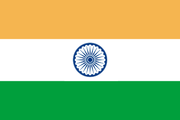India signs on to chemical patents to comply with WTO order
Wednesday, March 23, 2005

A bill passed by India's Parliament put an end to the manufacture of many cheap generic drugs copied from products protected by foreign company patents. A Patents Amendment Bill (2005) has been condemned by foreign aid groups who expect a significant rise in drug costs as a result of the bill.
Drug compounds in India were previously not protected by patents, meaning that research and developement costs borne by the originating manufacturers were avoided by generic drug producers. The new bill "will move India toward the patent mainstream and support and encourage innovation and investment in research and development in India," said Ranjit Sahani, managing director of Novartis India.
As the world's fourth-largest manufacturer of drugs by volume, the pharmaceutical industry in India is valued at US$5 billion - but ranks as only 13th by value, reflecting the low costs to consumers of the products. "Because India is one of the world's biggest producers of generic drugs, this law will have a severe knock-on effect on many developing countries which depend on imported generic drugs from India," said Samar Verma, regional policy adviser at Oxfam International.
Around half of African, Asian and Latin American HIV patients needing anti-retroviral drugs rely on low-cost drugs from India, which are sold at one twentieth the price of similar drugs produced in the West.
More than 90 per cent of drugs listed as essentials in India are either unpatented or expired. Drugs patented before 1995 -- when the World Trade Organization [WTO] set a 10 year deadline to enact protection -- will not be eligible under the bill.
Some degree of protection was mandated by WTO in order for India to have greater access to international markets. Opposers of the bill say it goes too far.
The Agreement on Trade-Related Aspects of Intellectual Property Rights [TRIPS], under WTO, allows developing countries to not provide patent protection for uses of known drugs, new dosages and formulations, or combinations of known drugs.
Sources
edit- Saubhik Chakrabarti. "Left in, NDA out, Patents Bill through" — Hindustan Times, March 22, 2005
- Sugita Katyal. "Health Activists Urge India to Review Patent Laws" — Reuters, March 22, 2005
- Agence France-Presse. "Indian legislators approve thorny drug patents bill despite protests" — Tribune de Geneve / Agence France-Presse, March 22, 2005
- Rajesh Mah. "Indian Passage of Patent Law Slammed" — ABC News / Associated Press, March 23, 2005